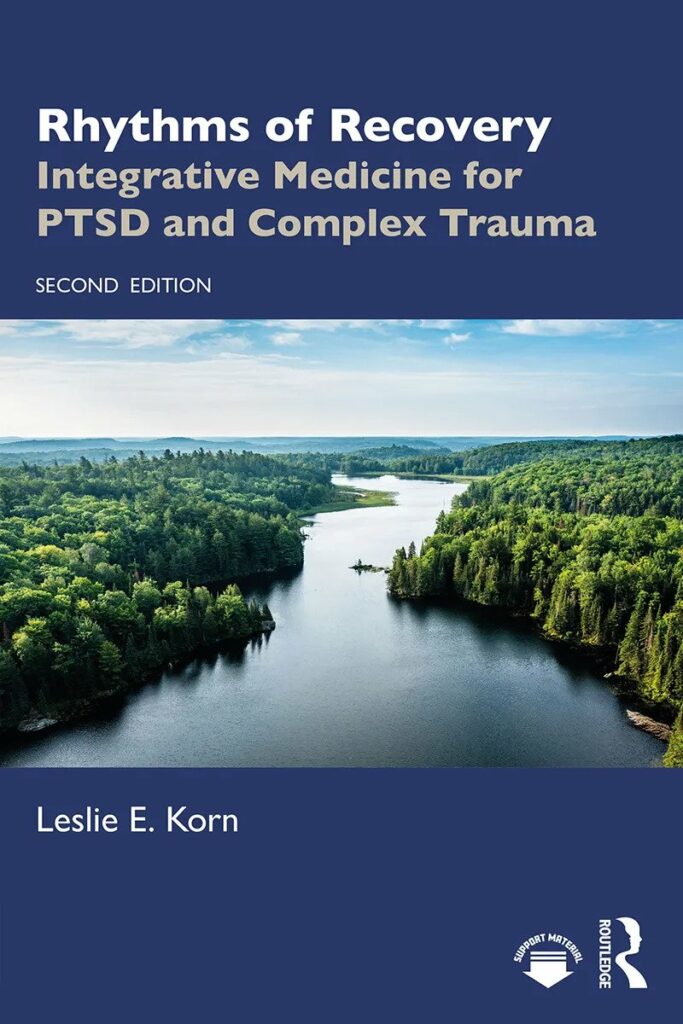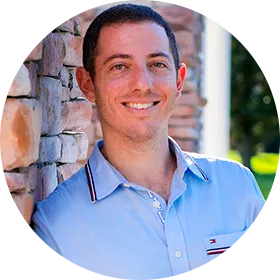
Rhythms of Recovery: Integrative Medicine for PTSD and Complex Trauma
NEW 2nd edition: Rhythms of Recovery is the seminal book on integrative medicine for the treatment of PTSD and trauma. In it, Korn explores East/West medicine, herbal and psychedelic medicine, yoga, and somatic and feminist therapies for the treatment of PTSD and complex trauma.
The new 2nd edition features practical methods, illuminated by clinical vignettes, for integrating psychotherapies with somatics and bodywork, yoga, nutrition, herbs, psychedelic medicines, and more. For practitioners and students interested in integrating the insights of complementary/alternative medicine and 21st-century science, this deeply appealing book is an ideal guide.
Get Your Copy of Rhythms of Recovery
Claim Your Free Bonus Material
(exercises, assessments, protocols, etc.)
What This Book Will Teach You
- How to integrate natural medicine methods with psychotherapy methods to treat PTSD and Complex Trauma
- How to address dissociation and self-harm in your clients
- Evidence-based research underlying somatic therapies
- When to use touch therapies or acupuncture and moxibustion
- To conduct an integrative assessment
- Assess and address anxiety hyperventilation using nutrition and yoga
- Intervene with nutritional and herbal therapies
- Assess for readiness for psychedelic medicine
- Use HBOT for traumatic brain injury
- How to work with therapy dogs for complex trauma treatment
And much more…
Praise
“This comprehensive guide is beautifully written and infused with wisdom, compassion, and spirit. Dr. Korn has mastered the balance of the science of healing with the hope of recovery. A true guide for both nourishing the brain and nurturing the mind.”

James Greenblatt, MD
Medical director, Psychiatry Redefined
“Dr. Leslie Korn provides us with a powerful and useful clinical guide for the treatment of persons suffering from traumatic experiences. Rhythms of Recovery is a comprehensive guide for clinicians and others seeking health information, one that integrates the art and science across diverse clinical disciplines. Dr. Korn’s book is an important reference work that details how to treat complex trauma by integrating nutritional, herbal, and other transformative strategies along with psychotherapies. Readers will be inspired by Dr. Korn’s case examples, exercises, and protocols.”

Uma Naidoo, MD
Nutritional psychiatrist, professional chef, and author, This Is Your Brain on Food
“. . . A must read for ALL clinicians, not just those in the psychiatric or mental health specialties. Dr. Leslie Korn has a unique worldview of trauma. Her vast knowledge and experience across cultures intertwine with her clinical expertise in incorporating holistic modalities. This wisdom culminates in a comprehensive treatment plan for traumatic stress and complex trauma.”

Mary Ann Osborne, DNP, FNP
Integrative nurse practitioner
“In Rhythms of Recovery, Leslie Korn draws on her experiences in the jungles of Mexico and work with indigenous healers, expertly weaving together storytelling, mythology, traditional wisdom, history, and the latest scientific research to convey a holistic view of the relationship between trauma and the body. Rhythms of Recovery is a must read for trauma therapists and anyone interested in a deeper understanding of trauma.”

Marlene Seven Bremner
Author of Hermetic Philosophy and Creative Alchemy and the Journey Through the Seven Spheres
“Rhythms of Recovery is brilliant and comprehensive. Integrating work from numerous disciplines, Dr. Korn brings profound insight to the impact of trauma and the body. She guides us in listening to the body and provides extraordinary guidance with practical and alternative forms for health and healing. This is a long awaited and needed book—amazing work!”

Lisa Machoian, EdD
Author of The Disappearing Girl: Learning the Language of Teenage Depression
“All emotional disorders are the result of trauma, mostly from in utero through the first seven years of life. The modern uncivilized practices of unlimited wars and repeated forceful immersion of soldiers in barbarian trauma have produced an epidemic of PTSD. Rhythms of Recovery offers a road out of the insanity.”

C. Norman Shealy, MD, PhD
President of Holos University Graduate Seminary
“Most books on trauma are one-dimensional; they may deal with emotions and cognitions but leave out consideration of the body. Or they may deal with the body but leave out consideration of the environment around the body or omit a broad cultural context. Korn’s book manages to integrate psyche, soma, and spirit as well as nature, physiology, and culture through the theme of rhythm.”

Ilene Serlin, PhD
in PsycCRITIQUES
“Rhythms of Recovery is a masterful manual for recovering from trauma. Dr. Korn is one of the few people I know who combines practical integrative tools with a deep understanding about the psychological complexity of trauma. She covers a comprehensive range of treatments that includes everything from diet and nutrition to herbs to psychedelics. I strongly recommend this book as part of the path to healing and true health.”

Scott Shannon, MD
Psychiatrist and principal investigator, MAPS “MDMA-Assisted Therapy for Treatment of Severe PTSD” study
“Dr. Korn, a healer, feminist, and researcher, is a pioneer in the field of trauma therapy. Her profound perspectives are an important part of trauma treatment today. She brings to life the value of a multimodal approach to healing trauma and provides an in-depth explanation of the ways in which the rhythms of nature are part of understanding how to work with the traumatized person’s spirit, mind, and body. The trauma model of recovery proposed here assists each of us in learning to tune in and be perceptive.”

Judith Pentz, MD
Associate professor in psychiatry, University of New Mexico; author of Cleanse Your Body, Reveal Your Soul
“In this phenomenal book, Leslie Korn explores ever-more important processes of self-regulation and offers insights of great practical and philosophical value. The multidisciplinary nature of this book is rooted in that rare combination of solid research, diverse clinical experience, and a profound understanding of the natural processes underpinning well-being.”

Leon Chaitow, DO
Journal of Bodywork and Movement Therapies

Sasha Chaitow, PhD
Series editor, The Leon Chaitow Library of Bodywork and Movement Therapies
“We experience our world through the power of rhythm. The way our parents coo to us, our experience of day and night—these all calibrate our system. Leslie Korn does a tremendous job connecting the ways in which those outside factors create consistency and stability within our daily lives and affect how our nervous systems function. When challenging life events disrupt those rhythms, we need tools to recalibrate and realign those systems. This book provides these tools.”

Andrew Pleener, MD
Founder and director of #SameHere Psych and STARR Alliances
“I highly recommend trauma therapists to test the integrative path to understanding and healing Dr. Korn invites us to tread”

Ellert Nijenhuis, PhD
Coauthor of The Haunted Self: Structural Dissociation and the Treatment of Chronic Traumatization
Get Your Copy of Rhythms of Recovery
Claim Your Free Bonus Material
(exercises, assessments, protocols, etc.)


Preface to the Second Edition
The origins of this book and the clinical vignettes I explore began during my clinical fellowship in psychology and religion at Harvard Medical School in the Department of Psychiatry in 1985. I had been in clinical practice for ten years, practicing bodywork and natural medicine to treat physical and emotional trauma while living in the jungle of Mexico.
I entered the program because I wanted to understand more deeply how to respond to stories my patients told me in response to my touch on their bodies—memories of pain and distress. In the mid-80s, even as there were vestiges of Reichian and Gestalt therapies lurking in the hallowed corridors of Harvard, the idea of bringing the body into treatment, to speak the language of the body and gently touch the body, was quite simply, heretical in a profession that was by and large still mired in the “distancing” required by psychoanalytic/psychodynamic theory and the mythical complex of Oedipus.
As I worked with my patients—those whom our profession often stigmatizes as “difficult and dangerous,” the so-called borderline or suicidal patients—I listened to them with my hands and mind. I did so as they traversed their bodily terrain of dissociated pain and found their inner rhythms that had long ago been thrown o their axis by traumatic events. In the 80s and even into the 90s, Mindfulness meditation (Vipassana) was still nascent and closeted in the conventional mental health arena, and even referrals to 12-step programs were not the norm. The application of nutrition for mental health, called Orthomolecular medicine (the use of micronutrients for brain/mind health), had been around since the 50s. Yet, the use of nutrition for the brain was considered (and still is, in some circles) the province of a few eccentrics.
During the 80s, we entered an important conceptual crossroads in treating trauma. Dr. Judith Herman had published Father-Daughter Incest, the pioneering work that helped, yet again, to clear the fog of social dissociation and denial that surrounded the reality of the prevalence and damage caused by family sexual violence. At the same time, Dr. John Wilson navigated cultural boundaries by collaborating with Native communities and introducing greater numbers of war veterans to the Lakota healing ritual of the sweat lodge, thus bringing an ancient restorative tradition to the repertoire of post-war healing.
After my fellowship, I continued with my private practice in Boston. The late 80s brought a new reckoning—the ubiquity of sexual abuse and mind control by (predominantly male) therapists, psychiatrists, gurus, and clergy. As I contend in this book, there is a profound relationship between patients’ sexual and mental abuse, the patriarchal fear of the (women’s) body, and the taboo on therapeutic touch. This manuscript follows my evolution as a clinician healer. I finished the first edition in 1996, and the original publisher found it too radical in its suppositions. Instead of making the changes required for publication, I put the manuscript away and headed back to work in the jungle. But like many events in our lives, this disappointment had its silver lining.
Nearly 15 years later, a new opportunity to publish this book, intact, under the expert guidance of Anna Moore at Routledge, emerged, just as my thinking and clinical observations had evolved even further. I added chapters on additional subjects: Nutritional and Herbal Medicine, Detoxification, and Psychedelic (entheogenic) Medicine. For this edition, despite my passion for the subject, space limitations required that I cut significantly into the sections on the history of medicine and healing. Those interested may find these sections in the first edition of the book.
The reissue of my book Rhythms of Recovery: Integrative Medicine for PTSD and Complex Trauma in its second edition is evidence of how much the field of trauma treatment has advanced. With the Adverse Childhood Events (ACEs) research, we recognize that most mental and chronic physical illnesses have their etiology in traumatic events and chronic stress. The analysis and recommendations I suggested nearly ten years ago in the first edition have found a significant, if not universally, accepted, place in trauma treatment.
Some innovations have found their clinical footing: the recognition that circadian rhythm is a neurohormonal disruption in trauma and can be re-regulated with light and specific lifestyle changes of exercise, diet, nutrients, and herbal medicine. The practice of yoga and mindfulness in schools and prisons and for post-disaster fieldwork and the diversity of methods adapted to the needs of culturally diverse peoples is now widespread and incorporated, almost without a blink. The recognition of somatic and energy therapies (and acupuncture) involving both touch and non-touch methods acting along a spectrum of exposure and self-regulation methods are more widely implemented; clinicians know more about how to refer and people seeking training in body psychotherapies have many options.
Nutritional psychology/psychiatry is blossoming yet again. Since the first edition of this book, I have increasingly focused on applying nutrition to trauma treatment and helping people reduce and eliminate pharmaceutical use. I am convinced that if we do not provide the right fuel for the brain, mind, and body, clinical outcomes are at best limited and often fail. For example, the adverse effects of wheat (gluten) on mental health have been known for over 2,000 years. During WW2, Great Britain and other European countries had a grain shortage.
This shortage, in turn, led to significant improvement in the mental health of institutionalized patients. Even with substantive science about gluten’s contribution to psychosis, depression, and dementia, we are just now implementing strategies for sensitivities beyond celiac disease. Yet this too often remains the circumstance for the fortunate few who can afford tailored advice and tests.
That high fructose corn syrup leads to inflammation that causes or contributes to depression is also well established. Yet our residential treatment programs, detoxification centers, schools, public health agencies, and shelters where the rates of mental illness are high still serve cheap, refined grains and corn syrup-rich foods, no doubt worsening the illness they are trying to treat. Dr. Gerson’s illumination of the extensive gut-brain axis, appropriately called the Second Brain, supports my clinical experience that there is always digestive dysfunction in mental distress. When we restore digestive health, we provide the pillar for improving mental health.
Of course, this makes gut sense. Digestion requires a parasympathetic state, the holy grail of trauma. Genomics (and nutrigenomics) leads us to personalized medicine, which allows us to match the best diets and drugs to individuals confirming what we already know about indigenous and cultural wisdom worldwide—that there is no one right diet for everyone. Nutritional developments extend into the specific use of brain fuel. Vitamins and minerals like natural lithium regulate circadian rhythm and mood and protect brain neurons at low doses, with no side effects, options long ago introduced by Indigenous Peoples who routinely soak in lithium-rich “laughing” springs.
The well-established association between trauma, TBI, depression, and dementia onset provides us with a path to help the brain survive. Dr. Michael Lewis’s pioneering work with veterans using high-dose Omega 3 fatty acids (fish oil) supports this approach, along with Dr. James Harch’s application of hyperbaric oxygen therapy (HBOT) to restore oxygen-deprived brain cells. Both methods are among many that provide aggressive yet non-invasive techniques to restore normal metabolic function for the brain under stress.
Vitamin D is the most validated vitamin for mood, pain, and an immune system under stress, vital support, especially among people living north of the 37th parallel, where deficiency is nearly 100%. Providing people with vitamin D is a cost-effective public health intervention for treating mental health and pain. Fortunately, our advances in nutritional and herbal medicine research provide options to our clients and patients who clamor for alternatives to pharmaceuticals (and their side effects) if they can afford them.
There remain far too many specious applications of dangerous and ineffective psychotropic medications. The serotonin deficit theory of posttraumatic stress disorder (PTSD), which emerged in 1988 (concurrent with the arrival of fluoxetine), has yet to be proved. While short-term acute pharmacotherapy has its appropriate place, increasing evidence points to the dangers (and failures) of chronic pharmacotherapy for mental illness.
It is well established that side effects of selective serotonin reuptake inhibitors (SSRIs) and SNRIs include libido suppression, weight gain, long-term blunting of affect, discontinuation syndrome, and a significantly increased risk of death in people over 65. We need our mitochondria to “breath,” yet research suggests that SSRIs suppress mitochondrial respiration. Emerging research points to the increased risk of depression and dementia with chronic benzodiazepine, proton pump inhibitors, and NSAIDs, used at high rates by trauma survivors for anxiety, GERD, and pain, respectively.
Just as we emerge from the domination of over-prescribing pharmaceuticals, we are likewise nearly free of the ferment of fear of psychedelics and cannabis. We can reengage with research and early insights about their benefits. We benefit from an unbiased examination of the utility (and contraindications) of nature’s gifts for trauma recovery. Some researchers of the classics even suggest that it was not an apple that Eve ate in the Garden of Eden but the little psychoactive mushroom Amanita Muscaria that led to her beholding the goddess and god alike. The contributions of medicine to spirituality are bidirectional. Traumatic experiences often obliterate the sense of hope, meaning, purpose, and belonging to the transpersonal universe. The psychedelic pathway may help many find their way within once again.
Perhaps our most significant task is to ensure adequate training (more than the current one to two stress and trauma courses provided at the MS/PhD and MD levels) and overcome our segregation of mind, body, and spirit. Dr. James Lake, one of the seminal thinkers in the integrative medicine for mental health field, has informed our quest for evidence and rigor while asking that we genuinely integrate rather than add merely a patchwork of methods to existing paradigms. His extensive reviews and critique of the scientific literature provide a logical approach to reliable implementation while forging a new way of thinking that helps us overcome the cognitive compartmentalization into which we are all inducted during our clinical education.
This book is a philosophy of care and a roadmap to applying specific interventions. One of my goals is that, as practitioners, we overcome the persistent failures to diagnose and treat correctly. Adults with PTSD and complex trauma are often misdiagnosed as borderline or bipolar (our current diagnosis du jour). People with psychosis have high rates of traumatic exposure, coupled with food allergies; their fate is often sealed, absent a keen diagnosis and treatment plan. Children who score high on ACEs are called oppositional and defiant, or if they cannot focus, they have attention-deficit hyperactivity disorder.
Without integrative treatment, the trauma lens falls short or even fails. As I propose in this book, the integrative medicine trauma model of recovery is not easy or quick. Our patients often feel helpless to change. But we can help them to overcome the learned helplessness and engage a team to support each person in the context of family and community. I am convinced that the pathway described in this book, supported by evidence from past and present, will support our shared success for the benefit of those who seek our help.
About Leslie Korn
Dr. Leslie E. Korn, PhD, MPH, is a pioneer in the treatment of PTSD, complex trauma, and chronic physical illness. Her clinical work, which spans 45 years in private practice and public health, integrates psychotherapy with somatic therapies and complementary and alternative medicine to treat traumatic stress, complex trauma, and chronic physical illness.
She introduced somatic psychotherapy at Harvard Medical School in 1985, where she was a clinical fellow and faculty in the Department of Psychiatry. She was a Fulbright scholar in traditional indigenous medicine and an NIH-funded scientist in mind–body medicine. Leslie directed a pro bono health clinic in the jungle of Mexico for over 25 years. She currently works with clients to eliminate psychotropic medication and mentors mental health professionals about incorporating integrative medicine and nutrition for mental health into their practices. She is the author of ten books.
Get Your Copy of Rhythms of Recovery
Claim Your Free Bonus Material
(exercises, assessments, protocols, etc.)

Claim Your Free Bonus Material…
Included: Assessments, Protocols, Client Worksheets, Exercises, and Recipes.







